GAZA STRIP, Palestinian Territories: Israeli Prime Minister Benjamin Netanyahu approved Friday new talks on a Gaza ceasefire, a day after the world’s top court ordered Israel to ensure urgent humanitarian aid reaches people in the Palestinian territory.
But despite a binding United Nations Security Council resolution this week demanding an “immediate ceasefire,” fighting continued Friday, including around hospitals.
Regional fallout from the conflict also flared, with Israel saying it killed a Hezbollah rocket commander in Lebanon, and several Hezbollah fighters killed in Syria strikes that a war monitor blamed on Israel.
Netanyahu’s office said new talks on a Gaza ceasefire and hostage release will take place in Doha and Cairo “in the coming days... with guidelines for moving forward in the negotiations,” days after they appeared stalled.
In its order, the International Court of Justice (ICJ) in The Hague said: “Palestinians in Gaza are no longer facing only a risk of famine, but... famine is setting in.”
Philippe Lazzarini, head of the UN agency for Palestinian refugees, posted on X that the ruling was “a stark reminder that the catastrophic humanitarian situation in the Gaza Strip is man made + worsening.”
The court had ruled in January that Israel must facilitate “urgently needed” humanitarian aid to Gaza and prevent genocidal acts, but Israel rejected the case brought by South Africa.
The latest binding ICJ ruling, which has little means of enforcement, came as Israel’s military said Friday it was continuing operations in Al-Shifa Hospital, the territory’s largest, for a 12th day.
Throughout the coastal territory, dozens of people were killed overnight, the health ministry in Hamas-run Gaza said.
Among the dead were 12 people killed in a home in the southern city of Rafah, which has been regularly bombed ahead of a mooted Israeli ground operation there.
Men worked under the light of mobile phones to free people trapped under debris after an air strike, AFPTV images showed.
The ICJ ordered Israel to “take all necessary and effective measures to ensure, without delay” the supply “of urgently needed basic services and humanitarian assistance.”
The war began with Hamas’s October 7 attack that resulted in about 1,160 deaths in Israel, mostly civilians, according to an AFP tally based on Israeli official figures.
Israel’s retaliatory campaign to destroy Hamas has killed at least 32,623 people, mostly women and children, Gaza’s health ministry says.
Large parts of the territory have been reduced to rubble, and most of Gaza’s population are now sheltering in Rafah.
On Monday the UN Security Council demanded an “immediate ceasefire” in Gaza, the release of hostages held by militants, and “ensuring humanitarian access.”
Member states are obliged to abide by such resolutions, but the Doctors Without Borders (MSF) charity said nothing has changed on the ground.
Aid groups say only a fraction of the supplies required have been allowed in since October, when Israel placed Gaza under near-total siege.
Israel has blamed shortages on the Palestinian side, namely a lack of capacity to distribute aid, with humanitarians saying not enough trucks are allowed in to make deliveries.
With limited ground access, several nations have staged airdrops, and a sea corridor from Cyprus has delivered its first food aid.
The UN says Gaza’s health system is collapsing “due to ongoing hostilities and access constraints.”
Israel’s military accuses Hamas and the Islamic Jihad of hiding inside medical facilities, using patients, staff and displaced people for cover — charges the militants have denied.
On Friday the army said it was “continuing precise operation activities in Shifa Hospital” where it began a raid early last week.
Troops first raided Al-Shifa in November, before Israel in January announced it had “completed the dismantling” of Hamas’s command structure in northern Gaza. Palestinian militants and commanders had since returned to Al-Shifa, the army said.
Netanyahu has said troops “are holding the northern Gaza Strip” and also the southern city of Khan Yunis, amid heavy fighting.
“We have bisected the Strip and we are preparing to enter Rafah,” he said Thursday.
Netanyahu is under domestic pressure over his failure to bring home all of the hostages seized by militants on October 7. Israel says about 130 captives remain in Gaza, including 34 presumed dead.
About 200 militants have been killed during the latest Al-Shifa operation, the military said.
Near Al-Amal Hospital in Khan Yunis, troops carried out “targeted raids on terrorist infrastructure,” killing dozens in combat backed by air support, the army said Thursday.
Israeli tanks and armored vehicles have massed around another Khan Yunis health facility, the Nasser Hospital, the Gaza health ministry said.
An analysis of satellite images shows heavily damaged areas around the Nasser and Al-Amal hospitals.
Since the Gaza war began, Israel has increased its strikes in Syria, targeting army positions and Iran-backed forces including Lebanon’s Hezbollah movement, a key Hamas ally.
A Britain-based war monitor said Israeli air strikes Friday in north Syria killed at least 42 people, six from Hezbollah and 36 Syrian soldiers.
And Israel’s military said it killed Ali Abdel Hassan Naim, deputy commander of Hezbollah’s rocket unit, in an air strike in south Lebanon Friday.
US, Egyptian and Qatari mediators have tried to secure a truce in Gaza, but those talks had appeared deadlocked more than halfway through the Muslim holy month of Ramadan.
Tensions have risen between Netanyahu and Washington, which provides billions of dollars in military aid but has grown increasingly vocal about the war’s impact on civilians.
Washington has also raised the issue of Gaza’s post-war rule. It has suggested a future role for the Palestinian Authority, which has partial administrative control in the Israeli-occupied West Bank.
On Thursday, Palestinian president Mahmud Abbas approved the new government of prime minister Mohammed Mustafa, who said his cabinet will work on “visions to reunify the institutions, including assuming responsibility for Gaza.”
Hamas forcibly took Gaza from Abbas’s government in 2007.
Netanyahu says Israel must have “security responsibility” in Gaza, and has rejected calls for a Palestinian state.
Israel’s Netanyahu approves new Gaza ceasefire talks
https://arab.news/nvaev
Israel’s Netanyahu approves new Gaza ceasefire talks

- Regional fallout from the conflict also flared, with Israel saying it killed a Hezbollah rocket commander in Lebanon, and several Hezbollah fighters killed in Syria strikes
- Netanyahu’s office said new talks on a Gaza ceasefire and hostage release will take place in Doha and Cairo “in the coming days... with guidelines for moving forward in the negotiations“
Libya ‘crackdown’ forces aid groups to cease operations: diplomats

- Libya has struggled to recover from the chaos that followed the 2011 NATO-backed uprising that overthrew longtime dictator Muammar Qaddafi
TUNIS: Diplomats in Libya have said in a letter to authorities seen by AFP that several international humanitarian organizations were forced to suspend operations after threats by security services and forced resignations.
In the letter, which was obtained by AFP on Wednesday, 17 mainly European ambassadors and a UN official accuse the Internal Security Agency (ISA) of an “ongoing crackdown” on non-governmental groups and humanitarian aid workers.
In war-torn Libya split between two rival administrations, the ISA reports to the interior ministry in the capital Tripoli, seat of the UN-recognized government.
“Between March 13 and 27, the ISA summoned at least 18 staff members from six international NGOs for questioning,” said the letter addressed to the Tripoli-based foreign ministry.
ISA agents “seized some of their passports,” forced them to “resign from their positions” and pledge in writing never to work for an international NGO again, the letter added.
It also said the security service “sealed some of their offices.”
Beyond the six groups directly affected, the diplomats said that “many other organizations are suspending activities as a matter of precaution.”
AFP was not able to independently verify the claims made in the letter, dated March 27.
The authorities in Tripoli did not immediately comment on the matter, but announced a press conference later on Wednesday to address “the work of international NGOs.”
Libya has struggled to recover from the chaos that followed the 2011 NATO-backed uprising that overthrew longtime dictator Muammar Qaddafi.
It remains split between the UN-recognized government in Tripoli and a rival authority in the east, backed by military strongman Khalifa Haftar.
The diplomats’ letter does not name the organizations affected by the ISA’s alleged measures, but a source familiar with the issue said on condition of anonymity that they include the International Rescue Committee, the International Medical Corps and the Danish Refugee Council.
Contacted by AFP, the Danish Refugee Council said it “could not comment” on the matter. There was no immediate comment from the other groups.
The source said that some foreign NGO staff members had been ordered to leave Libya, while others had been barred from returning after recent trips abroad.
The source mentioned that the authorities had already imposed visa restrictions on foreign humanitarian workers between July 2022 and December 2023, but operations had continued using local staff or individuals who did not require visas.
In their letter, the diplomats from the European Union, France, Britain and other countries as well as a top UN humanitarian representative voiced concern about the impact of the measures.
The crackdown including detention and questioning of staff members has had a “particularly alarming” effect “on the provision of humanitarian primary health assistance,” the letter said.
It urged authorities to allow the NGOs to “reopen their offices and safely restart humanitarian operations as soon as possible.”
It also demanded that seized passports be returned to staff members, and “any resignation letters or pledges signed at the ISA office” invalidated.
Will US pressure on Iraq succeed in bringing Iran-backed militias to heel?

- The Popular Mobilization Forces are formally part of Iraq’s state security apparatus, but include powerful militias loyal to Iran’s IRGC
- A long-debated Iraqi law aims to regulate the PMF, but critics argue it will do little to curb their ties to Iran or ease American pressure
LONDON: It was a message that was both unequivocal and uncompromising. Iraq must rein in the sprawling network of militia groups that take their orders from Iran, and if they threaten American interests in the country, the US will respond.
The comments were delivered last week by Tammy Bruce, the US State Department spokesperson, in response to a question on a new law being wrangled over in Iraq about the future of the Popular Mobilization Forces.
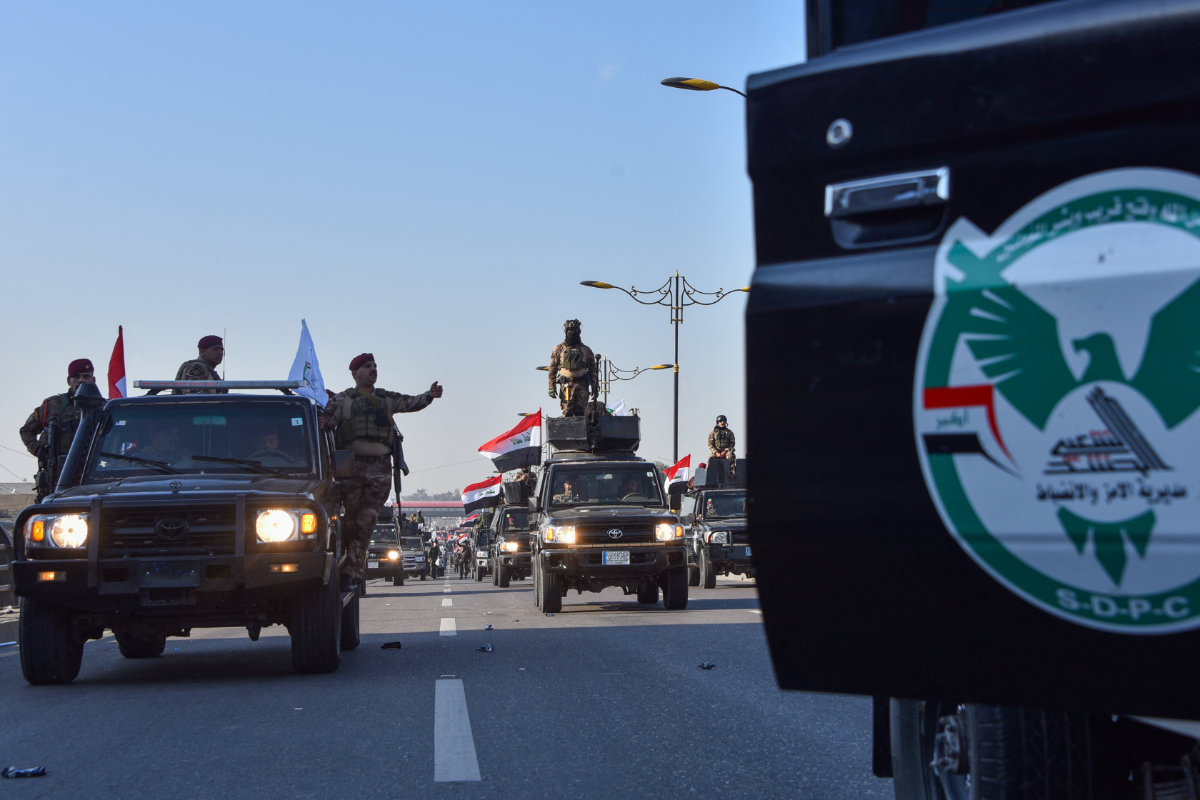
The PMF, an umbrella group for dozens of militias in Iraq, includes many that take their money and orders from Iran’s Islamic Revolutionary Guard Corps, despite belonging to Iraq’s formal state security apparatus.
Along with Hezbollah in Lebanon, the Houthis in Yemen, and Hamas in Gaza, they are considered part of Iran’s so-called “Axis of Resistance” — a network of proxy militias throughout the Middle East loyal to the IRGC.
America’s renewed military campaign against the Houthis, along with the degradation of Hamas and Hezbollah by Israel and the fall of Iranian ally Bashar Assad in Syria, has placed increased focus on Iraq’s Iran-backed militias.

They remain the only major Iranian proxy in the region to avoid significant Israeli or US military action since the Gaza conflict began in October 2023.
Doubts have been cast over whether the long-proposed Iraqi law to assert greater central government control over the militias would have much of an effect — or sufficiently appease US concerns.
But domestic events in Iraq, along with US President Donald Trump’s renewal of the “maximum pressure” campaign against Iran to suspend its nuclear program, place the PMF increasingly in the firing line.
There is a lot of pressure from the Trump administration on the government of Prime Minister Mohammed Shia Al-Sudani to rein in the Iran-backed militias, Renad Mansour, a senior Iraq research fellow at Chatham House, told Arab News. “Especially to stop any kind of attacks on American citizens or interests in Iraq.”
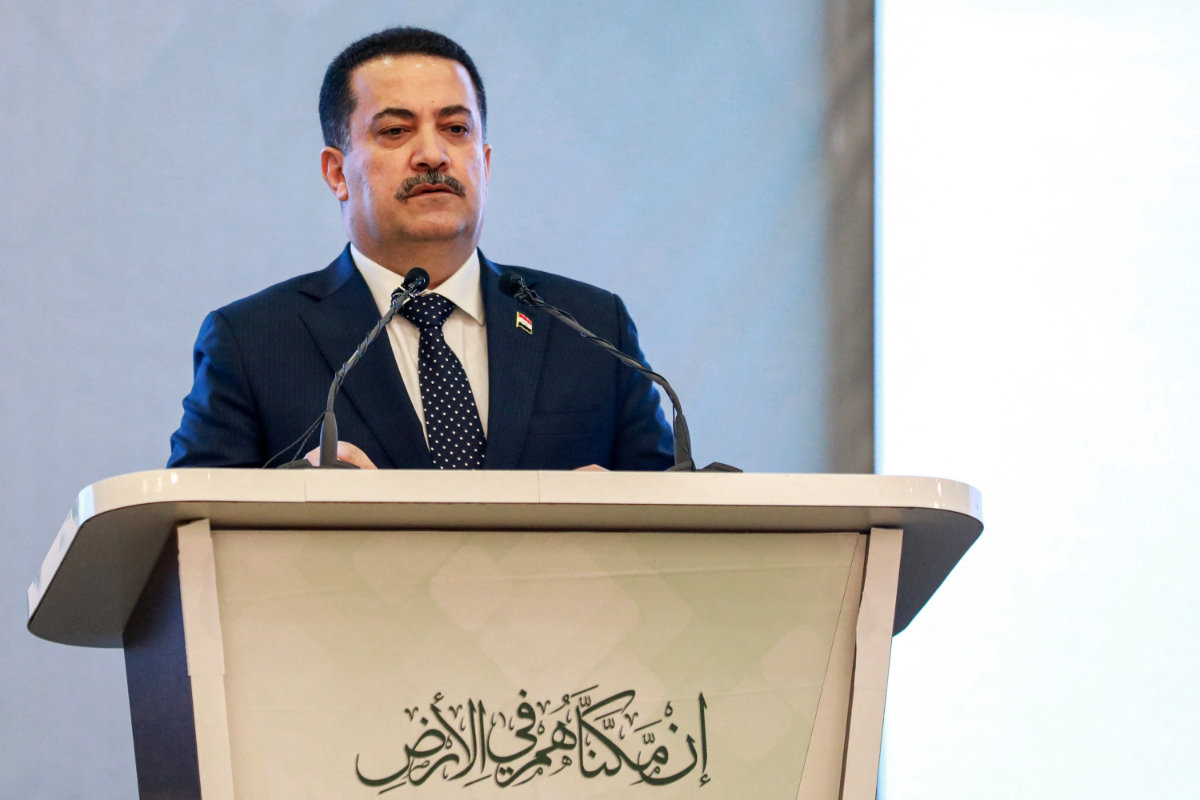
Mansour said the policy stemmed from renewed US efforts to combat Iranian influence in the region. “It’s very clear that the Trump administration is looking at Iraq as an important vehicle where Iran maintains economic and other types of authority,” he said.
The PMF, known in Arabic as Al-Hashd Al-Shaabi, was created in 2014 in response to a fatwa issued by the country’s top Shiite religious authority, Grand Ayatollah Ali Al-Sistani, after the extremist group Daesh seized swathes of territory.
The sprawling network of armed groups included many armed and funded by Iran. Many came from existing militias mobilized by the IRGC’s extraterritorial Quds Force.
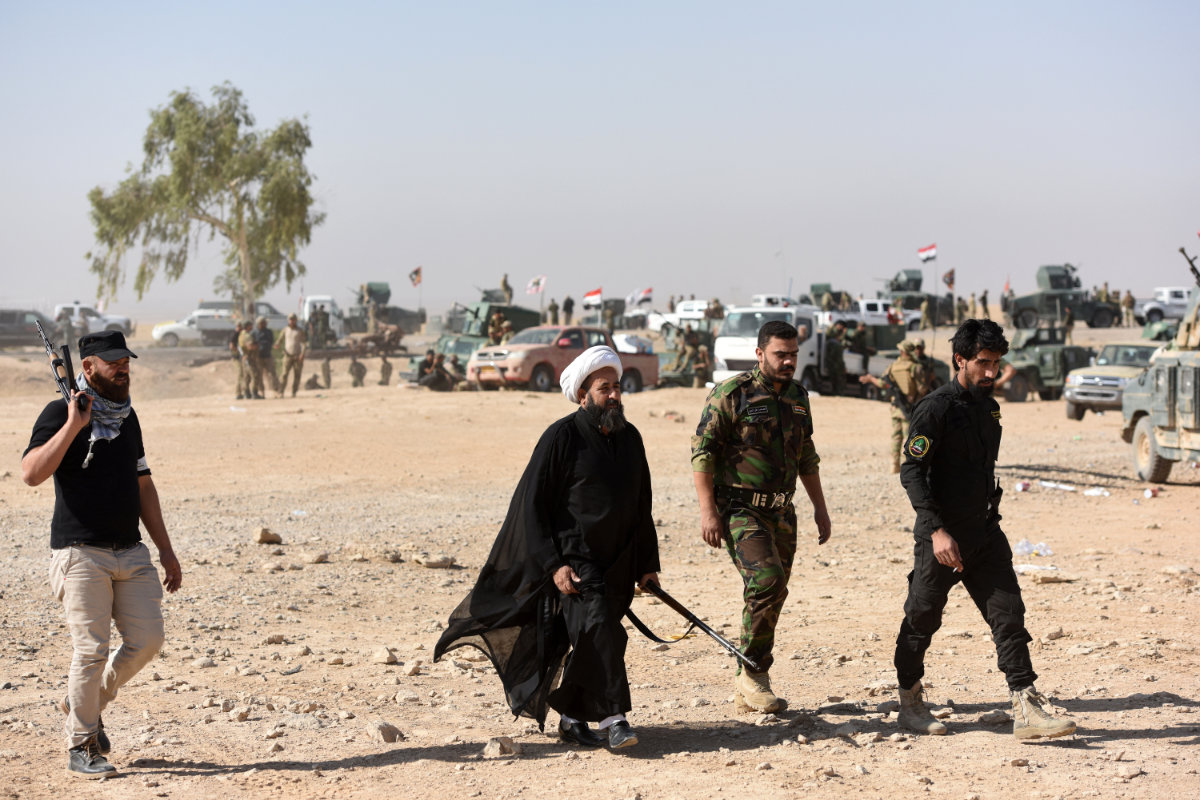
The PMF comprised approximately 70 predominantly Shiite armed groups made up of around 250,000 fighters. They played a major role in the defeat of Daesh in Iraq alongside the Iraqi Security Forces, Kurdish Peshmerga, and the US-led coalition.
After the extremist group was territorially defeated in Iraq in 2017 and attention turned to its holdouts in Syria, questions began to be raised over the purpose of the PMF.
A flimsy Iraqi law in 2016 attempted to exert more state control over the militias and included some basic details about their structure and employment terms.
IN NUMBERS
• 250k Fighters the PMF claims to have under arms.
• $3.3 billion Iraqi state funding at the PMF’s disposal.
Meanwhile, the PMF developed political wings that contested elections. These party blocs were accused by political rivals and Western governments of causing instability and acting in Iran’s interest.
The militias suffered a major blow in January 2020 when the first Trump administration killed PMF chief Abu Mahdi Al-Muhandis alongside Quds Force commander Qassem Soleimani in a drone strike near Baghdad airport.
Later that year, Al-Sistani, who had given the PMF its religious legitimacy when it was originally formed, withdrew his own factions as concerns over Iranian influence grew.
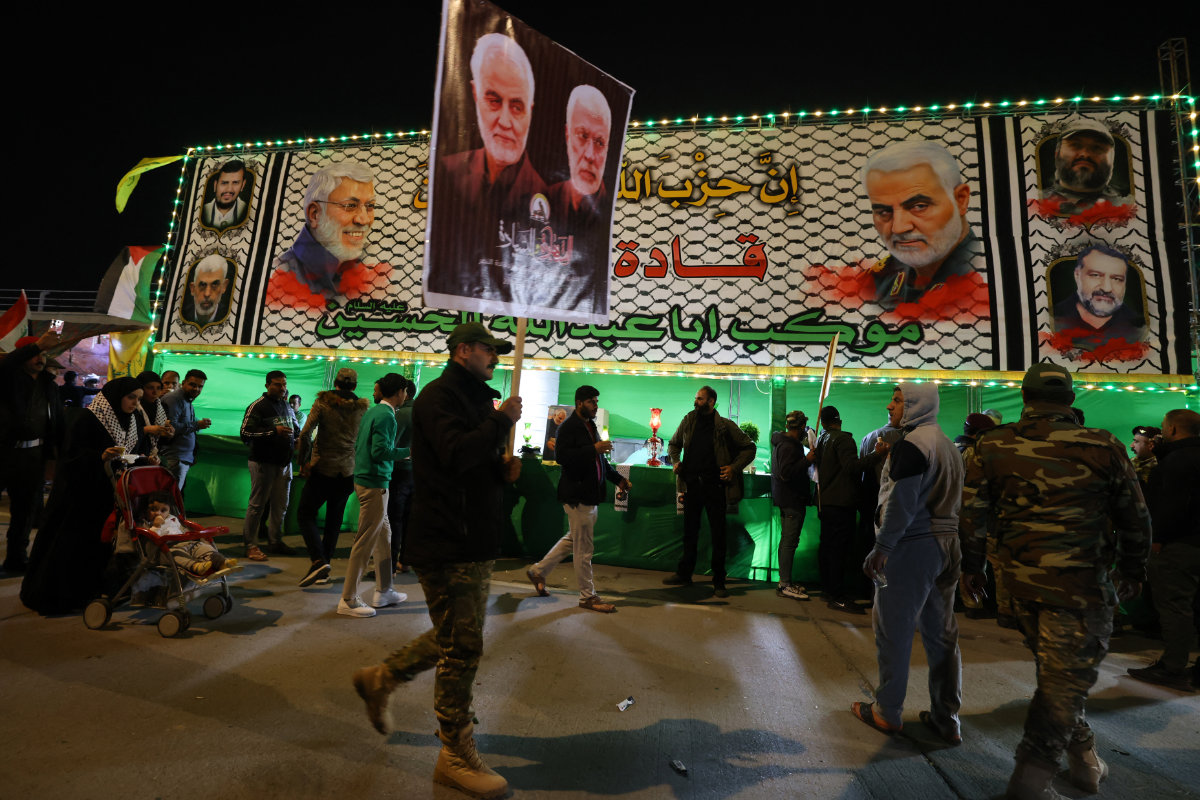
Yet the PMF managed to rebound from these setbacks, increasing both its funding and armory, including Iranian drones and missiles.
It has also been at the center of domestic turmoil, with its factions accused of an assassination attempt on then-Prime Minister Mustafa Al-Kadhimi in November 2021 and militias clashing with supporters of cleric Muqtada Al-Sadr in 2022.
After the Gaza war began in October 2023, the militias launched drones and missiles at Israel and carried out dozens of attacks on US bases in Iraq, where some 2,500 troops remain as part of the coalition mission against Daesh.
In February last year, the Biden administration bombed 85 militia targets in Iraq and Syria after three US soldiers were killed in a drone attack on a Jordanian outpost known as Tower 22.
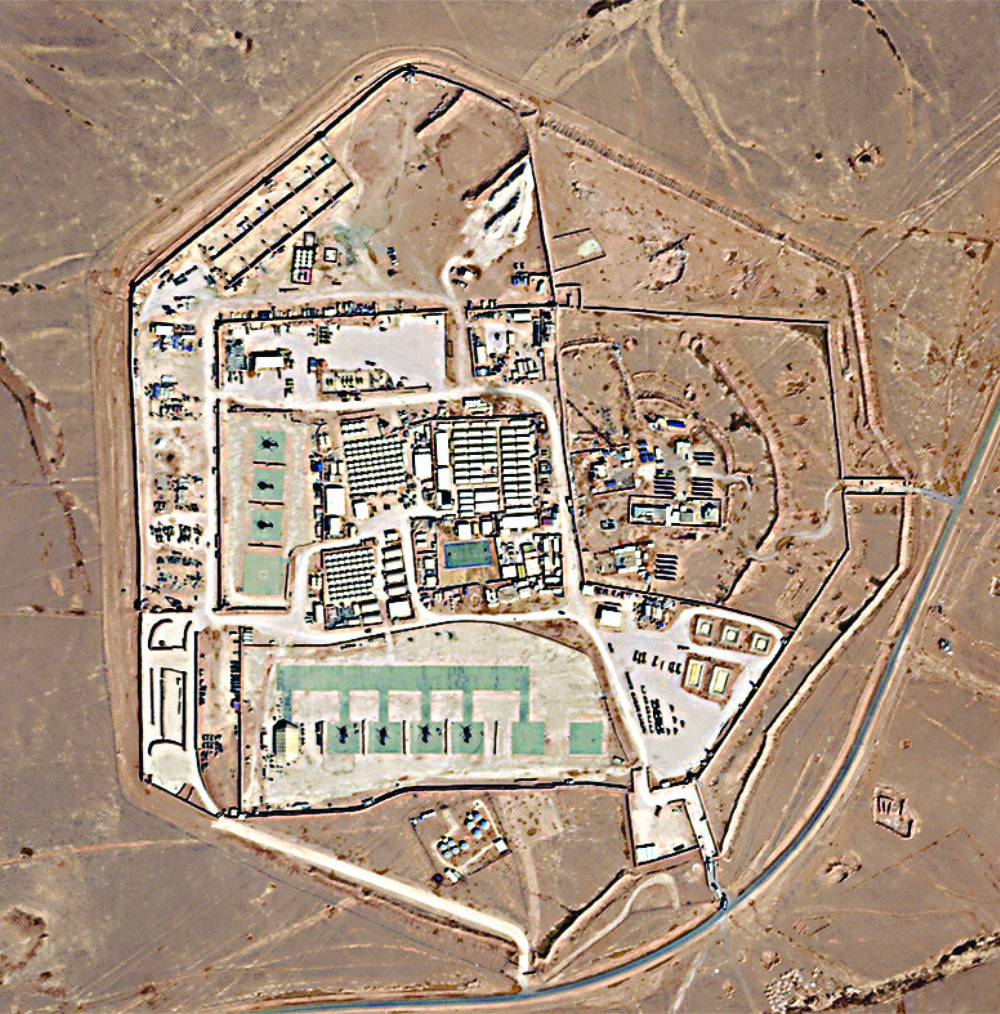
The US said senior commanders from the Kataib Hezbollah militia were among those killed. Since then, Iran has urged its militias in Iraq to refrain from attacking US interests.
“The Iraqi militias’ harassment of US targets in Iraq ended when the Biden administration took out three top commanders from the Kataib Hezbollah,” Hussain Abdul-Hussain, a research fellow at the Washington-based Foundation for Defense of Democracies, told Arab News.
“This signaled to militia leaders that their safety became at risk and their attacks stopped.”
The second Trump administration made clear in February when it issued the National Security Presidential Memorandum that Iraq’s militias would be central to renewed pressure on Iraq to reduce economic ties to Iran.
The other front is for Iraq to reduce dollar transactions with Tehran, particularly through cutting purchases of energy.
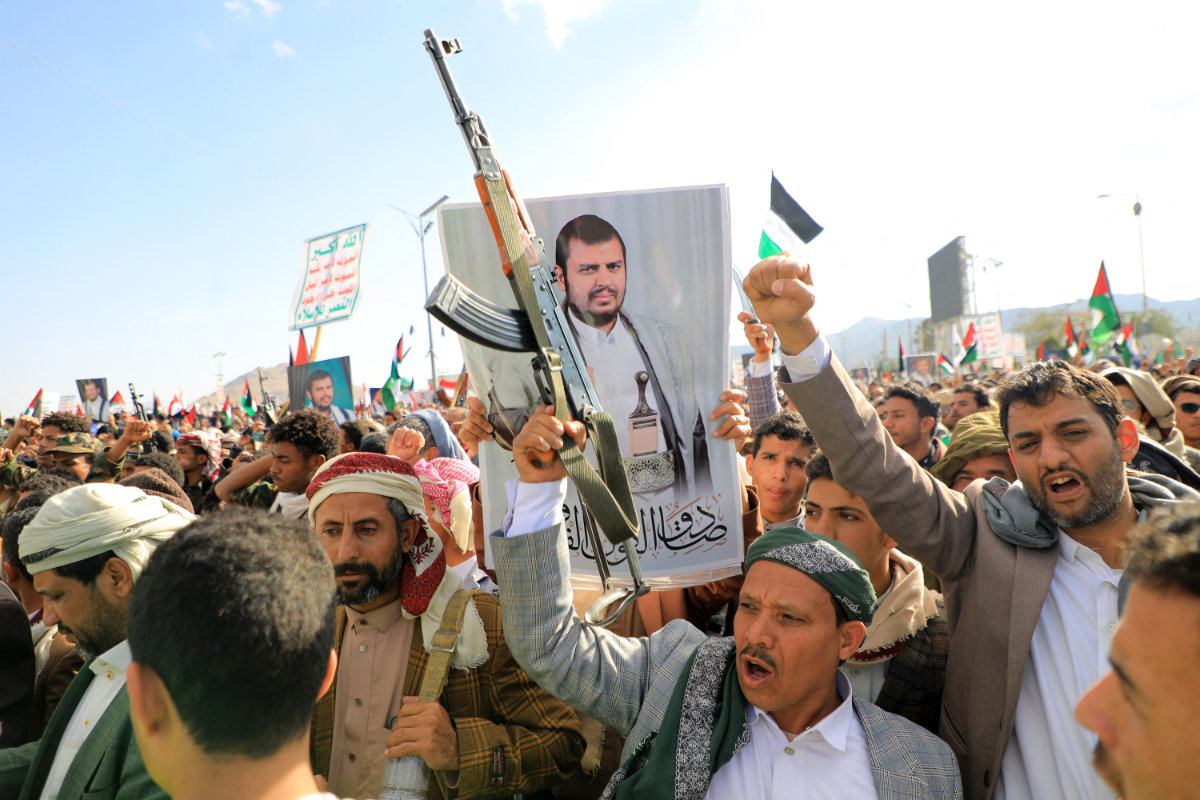
But there is also the wider geopolitical pressure on the militias as a result of US and Israeli attacks on Iran’s other proxies in the region, including Hamas, Hezbollah, and the Houthis.
“The Iraq militias became the last resort for all other Iranian militias across the region,” said Abdul-Hussain. “Since Israel crushed Hezbollah in Lebanon and Syria, the pro-Iran militia weight has shifted to Iraq.”
On the economic pressure now being exerted on Iran, he said the US is aware that the IRGC is siphoning US dollars from Iraq’s oil revenues, mainly using the $3.3 billion budget allocated to the PMF.
In response to this renewed pressure, the PMF Service and Retirement Law was introduced to the Iraqi parliament last week after months of wrangling over its contents.

The bill aims to fully integrate the PMF into Iraq’s state security forces. However, critics say it has been hijacked by rival Shiite blocs jostling for advantage within the organization.
In its current form, the bill is unlikely to fill the US with confidence that the PMF will fully submit to central government control and renounce fealty to Iran. Abdul-Hussain described the bill as a “total smoke screen.”
He said: “Parliament is trying to enshrine PMF perks by law for fear that the next executive chief might not be Iran-friendly and could thus cut the $3.3 billion with a decree. Laws trump decrees, and that’s why the Iraqi parliament is racing to enshrine PMF funding in a law.
“The irony is that the same law does not demand that the organization follow a military order or be included under the military’s rank or supervision. They want to take the money but keep the hierarchy in the hands of the IRGC.”

Israel’s military faces backlash over AI ‘Ghibli-style’ social media posts

- Attempt to jump on trend of posting AI-generated images in style of famed Japanese animation studio
LONDON: An attempt by the Israeli military to jump on the bandwagon of a social media trend that uses AI-generated images in the style of a legendary Japanese animation studio has spectacularly backfired.
The internet has been flooded by images in the style of Studio Ghibli after ChatGPT maker OpenAI launched a new image generator last week.
The craze has intensified debate over the extent to which artificial intelligence models breach copyright of artists. It also contrasts the painstaking work that goes into meticulously crafting the beautiful hand-drawn films produced by Studio Ghibli with the instant gratification culture fed by social media and the emergence of AI models.
Not wanting to be left out, the Israel Defense Forces on Sunday posted four images depicting different branches of its military in the Ghibli style on its social media accounts.
“We thought we’d also hop on the trend,” the post said.
What followed was a barrage of responses, many angry, many humorous, denouncing and mocking the post.
The images were shared as Israel intensified the bombing of Gaza where it has already killed more than 50,000 Palestinians and forced the population to flee their homes in an action it began in October 2023.
Many responded with AI-generated images in the Ghibli style on X that depicted Israeli brutality in the Palestinian territory.
The counter-images depicted Israeli soldiers mocking a blindfolded and handcuffed Palestinian child, and IDF troops pointing rifles at women and children against a backdrop of devastation.
“Colonizing art too,” read one reply in reference to Israel’s building of illegal settlements and its occupation of Palestinian land.
Other users pointed out that Hayao Miyazaki, the co-founder of Studio Ghibli, is a staunch pacifist and that many of his films contain strong anti-war messages.
He famously refused to travel to the US in 2003 to attend the Academy Awards where his work “Spirited Away” won an Oscar.
A video from 2016 appears to show Miyazaki’s disdain for AI-generated imagery. A clip from a documentary shows Miyazaki saying he was “utterly disgusted” after seeing an AI demo.
Suspected US airstrikes in Yemen kill at least 6 people, Houthi rebels say

- In addition, US overnight air raids left four people dead in Hodeida
- Houthi-held parts of Yemen have witnessed near-daily attacks blamed on the United States
DUBAI, United Arab Emirates: Suspected US airstrikes battered rebel-controlled areas of Yemen into Wednesday, with the Houthis saying the attacks killed at least six people across the country.
Meanwhile, satellite images taken Wednesday and analyzed by The Associated Press show at least six stealth B-2 Spirit bombers now stationed at Diego Garcia in the Indian Ocean — a highly unusual deployment amid the Yemen campaign and tensions with Iran.
The intense campaign of airstrikes in Yemen under US President Donald Trump, targeting the rebels over their attacks on shipping in Mideast waters stemming from the Israel-Hamas war, has killed at least 67 people, according to casualty figures released by the Houthis.
The campaign showed no signs of stopping as the Trump administration again linked its airstrikes on the Iranian-backed Houthis to an effort to pressure Iran over its rapidly advancing nuclear program. While so far giving no specifics about the campaign and its targets, White House press secretary Karoline Leavitt put the overall number of strikes on Tuesday at more than 200.
“Iran is incredibly weakened as a result of these attacks, and we have seen they have taken out Houthi leaders,” Leavitt said. “They’ve taken out critical members who were launching strikes on naval ships and on commercial vessels and this operation will not stop until the freedom of navigation in this region is restored.”
The Houthis haven’t acknowledged the loss of any of its leadership so far — and the US hasn’t identified any official by name. However, messages released by the leak of a Signal conversation between Trump administration officials and their public comments suggest a leader in the rebels’ missile forces had been targeted.
Fatal strike reportedly targets Hodeida
A likely US airstrike targeted what the Houthis described as a “water project” in Hodeida governorate’s Mansuriyah District, killing four people and wounding others. Other strikes into Wednesday targeted Hajjah, Saada and Sanaa governorates, the rebels said. Into Wednesday night, the Houthis said some 17 strikes hit Saada, with a person being killed in a strike at Ras Isa port in Hodeida and another at a telecommunication site on Jebel Namah mountain in Ibb governorate.
The rebels say they’ve continued to launch attacks against US warships in the Red Sea, namely the aircraft carrier USS Harry S. Truman, which is carrying out the majority of the strikes on the Houthis. No warship has been struck yet, but the US Navy has described the Houthi fire as the most intense combat its sailors have faced since World War II.
The aircraft carrier USS Carl Vinson, now in Asia, is on its way to the Middle East to back up the Truman. Early Wednesday, Pentagon spokesperson Sean Parnell said that “additional squadrons and other air assets” would be deployed to the region, without elaborating.
More than 300 airmen and several A-10 Thunderbolt IIs have deployed into the Middle East as well to support the mission from the Idaho Air National Guard. The troops, from Idaho’s 124th Fighter Wing out of Boise, fly the aircraft known as the Warthog. The US military’s Central Command, which oversees Mideast operations, posted an image Wednesday of two A-10s flying in the region.
More B-2s seen at Diego Garcia
Satellite photos taken Wednesday by Planet Labs PBC and analyzed by the AP showed at least six nuclear-capable B-2 bombers deployed to Camp Thunder Bay on Diego Garcia in the Indian Ocean.
The deployment represents nearly a third of all the B-2 bombers in Washington’s arsenal. It’s highly unusual to see that many at one base abroad. Typically, so-called show of force missions involving the B-2 have seen two or three of the aircraft conduct operations in foreign territory.
The B-2, which first saw action in 1999 in the Kosovo War, is rarely used by the US military in combat, because each aircraft is worth around $1 billion. It has dropped bombs in Afghanistan, Iraq and Libya as well. The bombers are based at Whiteman Air Base in Missouri and typically conduct long-range strikes from there.
The US has used the B-2 in Yemen last year to attack underground Houthi bases. The B-2 likely would need to be used if Washington ever tried to target Iran’s underground nuclear sites as well.
The Houthis on Tuesday said that they shot down another American MQ-9 drone over the country.
Intense US bombings began on March 15
An AP review has found the new American operation against the Houthis under Trump appears more extensive than those under former US President Joe Biden, as Washington moves from solely targeting launch sites to firing at ranking personnel and dropping bombs on cities.
The new campaign of airstrikes started after the rebels threatened to begin targeting “Israeli” ships again over Israel blocking aid entering the Gaza Strip. The rebels have loosely defined what constitutes an Israeli ship, meaning many vessels could be targeted.
The Houthis targeted more than 100 merchant vessels with missiles and drones, sinking two of them and killing four sailors from November 2023 until January of this year. They also launched attacks targeting American warships without success.
The attacks greatly raised the profile of the Houthis, who faced economic problems and launched a crackdown targeting dissent and aid workers in Yemen amid a decadelong stalemated war that has torn apart the Arab world’s poorest nation.
Lebanese army expands presence in areas along Litani River

- It follows the launch last week of rockets toward Israel, and retaliatory Israeli airstrikes on the southern suburbs of Beirut
BEIRUT: A large contingent of the Lebanese army entered Yohmor Chkeif, north of the Litani River in Nabatieh governorate, southern Lebanon, on Wednesday. Rockets were launched from the area toward Israel last week.
A security source said forces patrolled the village, which is surrounded on three sides by the river. A video shared on social media appeared to show the troops entering the village.
The residents of another village north of the Litani River reported seeing Lebanese army Cessna drones in the skies over Nabatieh on Wednesday. An army unit, in cooperation with the UN Interim Force in Lebanon, recently entered Zawtar Al-Charqiyeh, which is located in the same governorate.
Ali Al-Amin, the editor-in-chief of the Janoubia news website, told Arab News the region is characterized by its valleys, mountains and rugged terrain. Under Hezbollah directives, only civilians are allowed in the area. But a Lebanese army unit entered Hezbollah military sites in Wadi Zawtar Al-Charqiyeh, close to the river, he added.
The valley was targeted by at least 200 raids during the recent war between Israel and Hezbollah. It reportedly contains large Hezbollah camps, training centers and weapon storage facilities.
The arrival of the Lebanese army in the area effectively marks the end of Hezbollah’s military presence there, Al-Amin said, though the group has not officially stated this. He suggested that Hezbollah might have reached an understanding with the army behind closed doors.
Last week, the army seized empty rocket launchers that had targeted Israel twice in the space of a week. An investigation has been launched in an attempt to identify those who fired the missiles. They remain unknown, although the Lebanese army said it arrested suspects from Syria and Palestine.
The launch of the rockets resulted in a significant deterioration in the security situation in Lebanon, jeopardizing the ceasefire agreement as retaliatory Israeli airstrikes targeted the southern suburbs of Beirut for the first time since the peace deal came into effect four months ago. Dozens of people were killed or injured by the Israeli strikes.
Army commander Gen. Rodolphe Haikal inspected the South Litani Sector Command two days ago and reinforced the Lebanese military’s commitment to the implementation of UN resolutions and the ceasefire agreement.
Army command said the general had highlighted the continued presence of Israeli forces in occupied Lebanese territory as the main obstacle to deployment of the army south of the Litani, and reinforcement of the ceasefire.
Further Israeli violations of the peace agreement were reported on Wednesday. According to media reports from southern Lebanon, the Israeli army “opened fire on a citizen from the border town of Odaisseh, injuring him slightly while he was driving his car on the Kfarkela-Odaisseh road.” The Ministry of Health also said a citizen was wounded by Israeli gunfire in the Odaisseh area.
The Israeli army also continued to target shelters being built by residents in border areas near homes destroyed during the conflict. A combat drone destroyed one such shelter in the center of the town of Yaroun but no casualties were reported.
At dawn, Israeli vehicles and demolition equipment based in the Labouneh area east of Naqoura, inside Lebanese territory, advanced toward Ras Naqoura. According to the National News Agency, they raised a dirt barrier that blocked the road on both directions opposite the Israeli Jal Al-Alam site, which overlooks the towns of Naqoura and Alma Al-Shaab.
The latest developments come as Russia Today reported that Lebanese security officials had received “concerning signals” suggesting that Israeli authorities intend to resume their campaign of targeted assassinations. A security source said Tel Aviv is committed to dismantling Hezbollah’s military arsenal and considers the Lebanese government’s efforts so far to achieve this to be inadequate.
The rising tensions followed a pre-dawn Israeli strike in Beirut’s southern suburbs on Tuesday that killed Hezbollah member Hassan Badir and his son. Civilians in a neighboring apartment were also reportedly killed.
In a separate security operation, the Lebanese army said on Wednesday it had shut down two illegal border crossings in the Hermel and Mashari Al-Qaa regions as part of its ongoing efforts to combat smuggling and unauthorized movements across the country’s northern and eastern border with Syria.




















